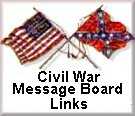 |
| Entrance to Fort Barrancas, Florida |
From a member of the Oglethorpe Infantry:
The Colonel says if there is any fighting to be done, the Oglethorpes shall have front seats in the Regiment. He also says that if we are a sample of city boys, we can out work country boys two to one. It is a fact, I never saw so much willingness in any company as has been displayed by the Oglethorpe Infantry—to perform any duty which they have been called upon to do—we have been called on to do mule duty, by pulling wagons and cars. We are all well, hearty and sun-burnt. We all keep clean, as the beach is only half mile, and we go down twice a day—after reveille and after regiment parade, six P. M. We have a mail daily, and received papers regularly.
From a member of the Southern Guard:
I am proud to say to you, that our soldiers are all perfectly contented and as loyal a body of men as have ever been congregated for any purpose. It does appear to me, after conversing with the soldiers freely, that every private here has been prompted by patriotism alone, and is willing to suffer anything that the body is capable of undergoing to gain our independence. With such material to use against the invading scoundrels of Fort Pickens, you may with all confidence expect to hear that we are victorious.
Sergeant James Medlock of the Washington Rifles writes:
What Gen. Bragg’s plans are, as a matter of course, I know not. But my impression is, from what I see and hear, that if Fort Pickens is not surrendered soon, it will be taken by force of arms—and that, too, within a few days. On this point, however, there is quite a diversity of opinion. We have several guns that I believe can do the work in a short time.
And from Lieutenant Chester A. Stone of the Gate City Guards:
Pensacola is a beautiful place—magnolias and flowers of all kinds in full bloom. Our company are all well and enjoying ourselves merrily. We are ready, at a moment’s notice, to meet the armies of the Rail-Splitter, and split them worse than he ever did rails.
.jpg)










